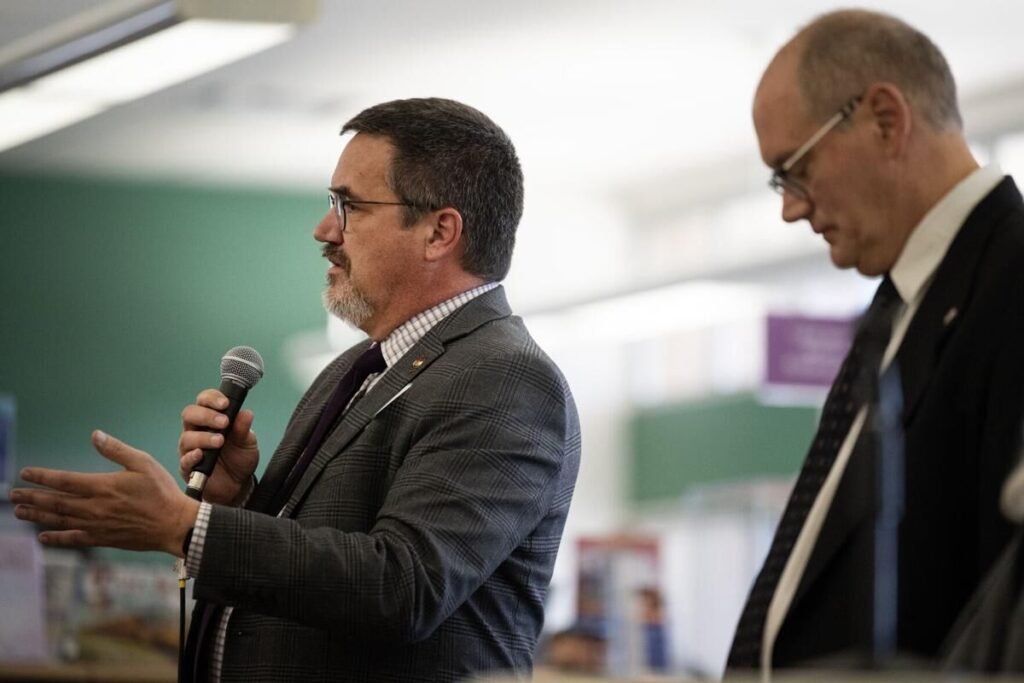Appeals court rebuffs lawsuit seeking $1 billion from CU Foundation

The state’s second-highest court rebuffed a multimillionaire donor and three others – a current University of Colorado student and two alumni – on Thursday, refusing to reinstate their lawsuit seeking $1 billion from the nonprofit that manages and invests CU’s donations.
A three-judge panel for the Court of Appeals ruled that only the Colorado attorney general or a party with a “special interest” may sue the University of Colorado Foundation for mismanaging its investments. Although the plaintiffs argued that students, teachers and donors to academic programs have an interest in ensuring the foundation makes prudent financial choices, the government objected to setting a precedent for virtually anyone affected by a charitable foundation to sue.
The panel sided with the latter argument, rejecting the idea that private citizens could hold the CU Foundation liable for the $1 billion it allegedly “lost” in the last decade by choosing one investment approach over another. At the same time, the appellate judges viewed with skepticism the plaintiffs’ allegation that the proposed class action lawsuit would “greatly benefit CU.”
“We pause to observe that, despite plaintiffs’ assertions as to how these unrealized funds could have been used, their primary requested remedy is disbursement of this ‘approximately $1 billion’ not to CU, but to themselves and the class members,” wrote Judge Jerry N. Jones in the March 31 opinion.
Clarence Herbst, who has donated approximately $5 million to the university and has multiple entities named after him within the CU system, chiefly took issue with the CU Foundation’s approach to investing its multibillion-dollar endowment. Herbst, formerly the chair of the foundation, believes index funds that track the broader stock market are the more prudent choice than actively-managed money.
Herbst alleged that had the foundation adopted his approach, it would have resulted in a $1 billion increase to the endowment since 2009.
“Plaintiffs, like other class members, were subjected to higher tuition fees, fewer resources, lower faculty salaries, fewer world-class educational opportunities, and fewer world-class educational facilities due to the CU Foundation’s poor and unlawful investment strategies and performance,” reads the lawsuit.
CU alumni Gerald Miller and Jerome Young, and current student Emmanuel Alfaro joined Herbst in the litigation. Herbst himself is a CU graduate as well.
They alleged that the foundation violated the Uniform Prudent Management of Institutional Funds Act, a law that 49 states and the District of Columbia have adopted governing the management of money donated to charitable institutions. The law allows for investments in “any kind of property or type of investment,” and explicitly notes that compliance with the law should not be judged in hindsight.
The CU Foundation emphasized that provision to the appellate panel.
“It’s like someone saying you should have invested in Bitcoin or you should have invested in Amazon stock 20 years ago,” said Michael Hazel, attorney for the foundation. “And not just that you should have, but your failure to do so was unlawful.”
In October 2020, then-Denver District Court Judge Robert L. McGahey Jr. dismissed the lawsuit in a three-sentence order. The plaintiffs then turned to the Court of Appeals. Even though no other states’ courts had interpreted the uniform management of funds law to allow for the kind of lawsuit at hand, the plaintiffs argued that Colorado lawmakers had not specifically limited enforcement to only the attorney general.
“It’s a question for the legislature to resolve. I don’t think this court has a duty to put bars on the door of the courtroom,” attorney Matthew Johnson argued before the appellate panel last month. He quickly ran into resistance from all three judges.
“It seems as though the repercussions of your argument are that any donor could file suit if the donor believed the university or the foundation had not made prudent investment decisions,” observed Judge Lino S. Lipinsky de Orlov.
“Maybe not any donor, but if you’ve created a program or if you’ve gone to the university since 2009, it’s still a very broad range,” added Judge Christina F. Gomez.
Jones warned that charitable foundations “can be simply sued out of existence by virtue of serial lawsuits by innumerable people. You’ve got tens of thousands of people that you claim have standing. And under your theory, each one of them can file a lawsuit against the foundation.”
The panel also balked at one particular allegation in the lawsuit that investing in index funds was the “duty” of the CU Foundation.
“How is a judge capable of making that type of decision? Judges aren’t investment advisors,” Lipinsky said.
The University of Colorado told the court that, as the named beneficiary of the foundation, it had a special interest in the investment decisions. Therefore, it had standing to bring an enforcement lawsuit – if it wanted.
“Plaintiffs claim that they are acting on behalf of the University – the allegedly ‘injured’ party. But the university denies that it has suffered any such injury,” lawyers with the Colorado Attorney General’s Office wrote on behalf of CU.
Adding their support for the foundation were Colorado State University, the Colorado School of Mines and Metropolitan State University of Denver. They warned that not only would their own tens of thousands of students be able to file lawsuits if the plaintiffs prevailed, but also students in public school districts like Denver and Aurora, which also have foundations supporting them.
Denver Health, United Way and Goodwill Industries were among the other entities that, potentially, would need to fend off second-guessing by “financial hobbyists,” they argued.
The Court of Appeals affirmed that neither Herbst’s status as a donor nor the three remaining plaintiffs’ status as CU students gave them standing to challenge the foundation’s investment decisions.
“On behalf of Mr. Herbst, he is appreciative of the extensive effort undertaken by the Colorado Court of Appeals, although he disagrees with the ultimate outcome. Plaintiffs intend to evaluate their legal options in the coming days,” Johnson told Colorado Politics in response to questions about whether the plaintiffs would now ask the attorney general to investigate.
A spokesperson for Attorney General Phil Weiser declined to comment.
The case is Herbst et al. v. University of Colorado Foundation et al.














